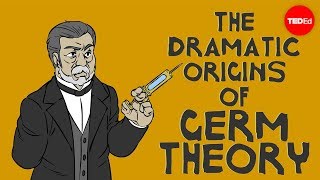(单词翻译:单击)
What if I told you that all illnesses, things like the cold, the flu, strep throat,
如果我说,所有疾病,像感冒、流感、链球菌性咽炎,
came from wandering clouds of poisonous vapor?
都是四处飘散的有毒烟雾导致的,会怎样?
You'd probably think that absurd, and, don't worry, it's completely wrong.
你多半会觉得这很荒谬,别担心,确实很荒谬。
Yet that's actually what people thought caused diseases for several centuries.
不过曾经好几百年里,人们确实以为那是致病原因。
They called it miasma theory, and everyone from the public to the medical establishment accepted it.
人们称之为“瘴气”学说,而且从普通百姓到医疗机构都接受这一说法。
But by the 1840s, in the midst of devastating cholera outbreaks in London,
不过到19世纪40年代,伦敦遭遇霍乱大爆发之际,
a small group of scientists had grown skeptical.
几位科学家开始质疑瘴气学说。
Early microscopes had revealed the existence of tiny microorganisms,
早期显微镜发现了小小微生物的存在,
and they proposed that it was actually these germs that cause diseases, hence the name germ theory.
科学家提出是这些细菌导致疾病的说法,因此将它命名为细菌学说。
Though most people held onto their assumptions and strongly resisted this theory,
不过大多数人还是坚持原来的观念,强烈反对细菌学说,
its supporters were determined to prove them wrong by collecting compelling data.
而支持这一学说的人却决心纠错,他们收集了强有力的数据。
Leading the charge was a physician named Dr. John Snow.
领军人物是一位叫约翰·斯诺的医生。
Dr. Snow observed that cholera-infected patients experienced severe vomiting and diarrhea,
斯诺医生发现,感染了霍乱的病人会出现严重的上吐下泻症状,
symptoms of the gut as opposed to the lungs,
这些是肠胃症状,跟肺部没关系,
and thought that perhaps the disease was transmitted through food or drink, not the air.
霍乱可能是通过食物或水传播的,而不是空气。
After investigating previous outbreaks,
通过调查之前疫情,
he became convinced that cholera was spread through contaminated water sources.
他确信霍乱是通过受污染的水源传播的。
Then, late in the summer of 1854 when cholera suddenly struck the Soho district,
在1854年夏末,霍乱突然在苏荷区爆发,
a neighborhood in London very close to his own, Dr. Snow was hot on its trail.
那是伦敦一个街区,离斯诺医生家很近,斯诺医生离真相也仅一步之遥。
He requested the records for the deceased, and within the first week, there had already been 83 deaths.
他要求对死亡病例进行记录,而仅一周内,死亡病例就达到83起。
He mapped out where each of the deceased had lived
他在地图上标出每位病逝者的住址,
and found that 73 of them resided close to the water pump on Broad Street.
发现73位都住在布罗德街的水泵附近。
Dr. Snow strongly recommended shutting down the pump,
斯诺医生强烈建议关闭水泵,
and because he knew how unpopular germ theory was,
不过他也知道人们不认同细菌学说,
he suggested that cholera was spread through a poison in the water instead of microorganisms,
所以他说水里有毒,霍乱因此传播,并未提及微生物,
when presenting his case to governmental officials.
这是他当时给政府官员的说法。
They were unconvinced, but agreed to shut down the pump as an extra precaution.
官员们虽然不信,但是也同意关闭水泵,以防万一。
Almost immediately, new cases of infection subsided.
新感染病例几乎立马减少了。
Bolstered by his success, Dr. Snow was determined to connect the contaminated pump water to the disease.
由于这次成功的激励,斯诺医生认定这水泵中受污染的水和这次疫情有关。

He found the story of a widow who had died of cholera and lived far away from Soho,
他查到一位因霍乱而去世的寡妇,家离苏荷区很远,
but had a servant bring her water from the Broad Street pump daily because she liked the taste.
但她让仆人每天从布罗德街的水泵取水给她,因为她喜欢那里的水的味道。
He also discovered a workhouse located around the corner from the Broad Street pump
他还发现,一处济贫院地处布罗德街水泵的街角处,
that housed hundreds of people, but only a handful had become infected,
那里居住着几百人,却仅有几人感染,
which Dr. Snow attributed to the fact that the workhouse had its own private well.
斯诺医生认为原因是该济贫院自己有一口水井。
Finally, Dr. Snow heard of an infant who may have been one of the earliest victims of the outbreak.
终于,斯诺医生听闻了一位婴儿的情况,他可能属于疫情最早的一批受害者。
He learned that the child's dirty diapers had been thrown into a cesspool
他了解到孩子的脏尿布都扔进了一个污水坑,
right next to the public water pump on Broad Street.
而这个污水坑正好挨着布罗德街的公共水泵。
Again, Dr. Snow presented his case, but even then, city officials spurned his theory,
斯诺医生再一次报告了他的发现,即便这样,市政府官员依然对此嗤之以鼻,
not wanting to admit that there was human waste in London's water supply,
既不愿承认伦敦供水系统中会出现人类排泄物,
or that they were wrong about miasma theory, which was, after all, hundreds of years old.
也不愿承认瘴气学说是错误的,毕竟,这一学说已存在了几百年。
It wasn't until 1884 that Dr. Snow's efforts were vindicated by Dr. Robert Koch,
直到1884年,斯诺医生的研究才得到了罗伯特·科赫医生的证实,
who isolated the cholera-causing bacterium.
他分离出了导致霍乱的病菌。
Koch developed a technique to grow pure cultures, and through a series of experiments,
科赫医生发明了一种纯培养技术,通过一系列实验,
definitively proved that a specific bacterium directly cause disease.
明确证实了是某种细菌直接导致了疾病。
Major contributions to germ theory also came from prolific scientist Louis Pasteur,
为细菌学说作出重大贡献的还有一位多产的科学家,路易·巴斯德,
whose study of microorganisms led to the development of the first vaccines.
他对微生物的研究引领人们开发出第一批疫苗。
By challenging assumptions with data-driven research,
用数据主导的研究挑战假设,
these scientists discredited an age-old theory and sparked a revolution that was incredibly beneficial to public health.
科学家因此推翻了百年旧观念,引发了一场革命,让公共卫生领域受益匪浅。
But all of this raises the question,
不过这也不禁让人思考,
what are the widely held scientific beliefs of today that our descendants will find ridiculous?
哪些现今广为人接受的科学观念,会让后人也觉得荒谬至极呢?
And as any scientist would tell you, a question is an excellent place to start.
正如每个科学家都会说,发明千千万,起点是一问。


